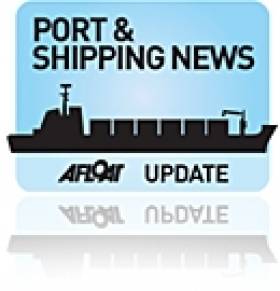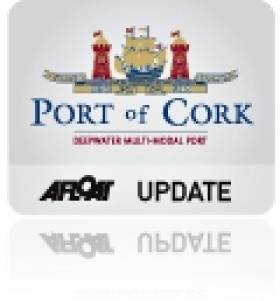Displaying items by tag: Energy Cork
Ports & Shipping Review: Fenit’s Crane Exports, Cork’s Energy Deal, Belfast’s Tonnage Record, Grounded Airbus Wingship Re-floated plus more…
P&SReview – Over the last fortnight, Jehan Ashmore has reported from the shipping scene, where the Stade, a cargo vessel rode out bad weather before docking at Fenit to load cranes built by Liebherr in Killarney, which as previously reported has received an order from the New Zealand port of Lyttelton.
The Port of Cork Company have signed up with Sustainable Energy Authority of Ireland (SEAI) in targets for improved energy efficiency set for 2020.
Drogheda Port handled over 1m tonnes of cargo, this level in throughput has not been surpassed since 2007. The Co. Louth port is to welcome a flotilla of tallships during the Drogheda Fringe Festival over the May Bank holiday.
For the first time, Paris will host this year's European (Shortsea '13) Conference on 14 March at La Defense. Last year the IMDO hosted the event in Dublin's Mansion House.
Ports across Europe urged governments not to touch the envelope of €31.7billion foreseen for Europe's transport infrastructure investments under the Connecting Europe Facility (CEF).
Belfast Harbour had a record 19.6m tonnes in 2012, up 11% on the previous year. The growth was primarily driven from the bulk and roll-on/roll-off (freight) sectors.
Irish Ferries fast-craft catamaran Jonathan Swift, returned fresh from dry-docking, she operates the Dublin-Holyhead route, where she clocks up an impressive 162,000kms each year.
A grounded ship that carries wings for the Airbus A380, Ciudad de Cadiz (2008/15,643grt) was re-floated yesterday, having broke moorings during a gale in late January off the Welsh port of Mostyn.
Port of Cork Signs Up to Energy Savings
#EnergyCORK- The Port of Cork Company have signed up as a partner of Sustainable Energy Authority of Ireland (SEAI) at a launch held recently by Energy Cork.
The partnership will see the port implementing an Energy Action Plan which will contribute to the national Public Sector energy efficiency improvement target which has been set for 2020. 'The National Energy Efficiency Action Plan 2009-2020' set a target of 33% reduction in energy use and its fulfilment will have a significant impact on the success of the Irish economy and on the creation of a more sustainable environment into the future.
This strategic plan will work in conjunction with the Port of Cork's existing environmental policy, and will aim to deliver energy savings of at least 3% annually which will see a significant reduction in energy consumption across the Port's operations.
Commenting on the partnership, Denis Healy, Manager of Engineering Services at the Port of Cork said "As we are a 24 hour port working 365 days a year, we are continuously looking for ways that we can become more energy efficient. This new partnership with the SEAI gives us a great opportunity to develop a structured programme and adopt best practice standards to work in a more sustainable way."
A key aim of the SEAI is to help public sector organisations achieve energy efficiency through facilitating the Partnership Programme, which offers a support package to large organisations towards meeting their obligations, in return for commitment to energy management.
The Port of Cork joins a number of other high profile organisations who have already become partners of the SEAI including UCC, the Defence Forces and Bus Eireann.





























































